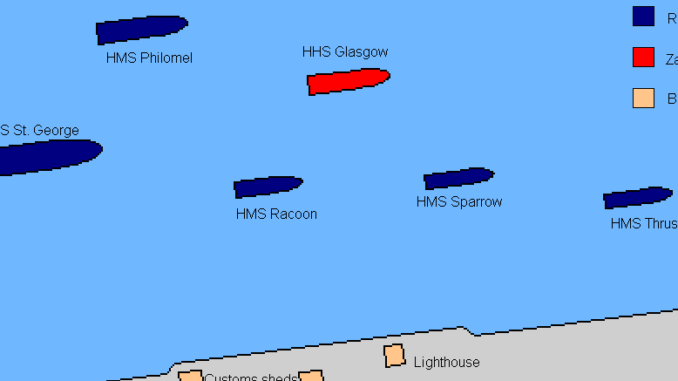
M*A*S*H famously lasted on television for a longer duration of time than the Korean War. On the other side of the coin, many miniseries on events like the Civil War or Vietnam are criticized for leaving out important events.
The perfect war for television, then, should be the Anglo-Zanzibar War.
It took place in 1896, and was fought between the U.K. and the Zanzibar Sultanate. The buildup happened before then, with the Heligoland-Zanzibar treaty between Germany and Britain, where Germany claimed influence over Tanzania and Britain over Zanzibar. The Sultan of Zanzibar, now effectively a client state of Britain, was a lush position… but life expectancy wasn’t long, because of the inadequacy of medicines in the area and political machinations. A new Sultan rose to power in 1893, Hamad bin Thuwaini.
On August 25, 1893, however Hamad died, likely due to a sudden attack of ingesting far too much poison. His cousin, a professional slaver named Khalid bin Barghash, happened to be at the palace that night and assumed the Sultanhood. He arranged a personal army within hours of Hamad’s passing, and by the end of the day had an army of 3000 men and artillery stationed in the palace walls. The amazingly efficient activity led many to believe that Khalid just might have been responsible for his cousin’s untimely death.
This did not sit well with the British. They had two warships in the area, the HMS Philomel and the HMS Rush. Another ship arrived late on the 25th, the HMS Sparrow. The 26th saw two more ships arrive, the HMS Racoon and the HMS St. George.
Starting soon after the assumption of power by Khalid, the British attempted to negotiate with him to step down. He refused, stating that he did not believe the British would dare to fire upon him. (Britannica)
From Historic UK:
At 9am the order was given for the British ships in the harbour to begin bombarding the palace. By 09:02 the majority of Khalid’s artillery had been destroyed, and the palaces wooden structure had started to collapse with 3,000 defenders inside. It is also around this time, two minutes after the bombardment started, that Khalid is said to have escaped through a back exit of the palace, leaving his servants and fighters to defend the palace alone.
By 09:40 the shelling had ceased, the Sultan’s flag pulled down, and the shortest war in history had officially ended after only 38 minutes.
To be fair, Khalid also sent his armed yacht after the British. The HHS Glasgow, moored in the harbor, attacked one of the warships and was promptly sunk.
On the afternoon of the 27th, Hamud bin Muhammed, a local leader very favorable to the British, was declared Sultan and given one somewhat damaged palace as a reward.
At 38 minutes, this war could be presented in real time and would still, after commercial breaks, just about fill a standard one-hour television time slot.
Not a battle, there have been other one-sided battles, but rather the entire war. That is efficiency.
Question for the night: have you ever bitten off more than you can chew in a fight or contest?
